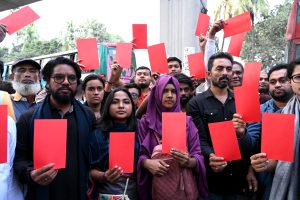Bangladesh’s January 7 general election, as expected, returned Prime Minister Sheikh Hasina and her Awami League to power for a fourth consecutive term, in a poll boycotted by the opposition.
According to results announced by the Election Commission on January 9, the AL won 222 out of 300 seats. A further 62 seats went to independents – many of whom were alleged to be “dummy candidates” that were actually AL supported but urged to run independently to give the election the veneer of legitimate competition. The only other party to notch more than one seat was the Jatiya Party. The result leaves Bangladesh’s parliament without any meaningful opposition yet again.
Notably, most of Bangladesh’s opposition parties – including the Bangladesh Nationalist Party – refused to take part in the polls under Hasina’s rule instead demanding a return to the old system of organization elections under a neutral caretaker government. The BNP boycotted the first elections under Hasina’s current stint in power, in 2014, but took part in the 2018 polls, only to be frustrated by winning a mere seven seats in an election widely marred by ballot box-stuffing and blocked voting stations, among other irregularities.
BNP leader-in-exile Tarique Rahman, in a pre-election interview with The Diplomat, called the polls “farcical” and “fraudulent.” He predicted the low voter turnout, saying that “voters have already rejected this election.”
Sure enough, observers on the ground reported seeing empty streets and polling stations on the day of the election. Bangladesh’s Election Commission initially reported turnout at a dismal 28 percent before inexplicably boosting that figure to 40 percent.
Even the higher figure would represent a steep drop-off from the 2018 polls, when 80 percent of voters were said to have cast ballots. One notable difference: The previous elections actually had major opposition parties taking part, though the end result suggested the polls were far from free and fair. Facing little true choice at the ballot box this year, many Bangladeshis opted to simply stay home.
With Hasina now ensconced in power for another term, her government’s crackdown on dissent is expected to continue. Before the polls, Bangladeshi authorities arrested thousands of BNP leaders and activists. Media freedom has also been sharply curtailed, according to international watchdog groups like the Committee to Protect Journalists and Reporters Without Borders.
Recognizing Bangladesh’s worrying slide into a one-party regime, the United States attempted to pressure the AL to hold free and fair elections, including by threatening “to impose visa restrictions on Bangladeshi individuals responsible for, or complicit in, undermining the democratic election process in Bangladesh.” Those facing sanctions “include members of law enforcement, the ruling party, and the political opposition,” the State Department said in a statement in September.
The policy, while widely discussed in Bangladesh and giving hope to the BNP, does not appear to have had much effect. The election results were just as anticipated, with no meaningful opposition participation. The main impact may be damage to Bangladesh-U.S. relations, as Hasina bitterly accused Washington of directly seeking regime change.
So far, the United States has not responded to Bangladesh’s election results. Both India and China, meanwhile, have congratulated Hasina on her victory, a clear sign that the AL will find support in New Delhi and Beijing regardless of what Washington decides.
The election results were never in doubt, but the question of “what now” still lingers. First, there’s the open question of how the United States, and potentially Europe, could respond. Hard-hitting sanctions could seriously damage Bangladesh’s ailing economy, as all five of the country’s top export destinations are the U.S. and European Union members (Germany, Spain, the United Kingdom, and Poland).
Meanwhile, the BNP – and the banned Islamic party Jamaat-e-Islami – have both been able to draw tens of thousands of supporters to mass rallies in the past year, suggesting the potential for street agitation in the future. The country has also faced a surge of economic-related protests recently, particularly in its readymade garment industry, a crucial staple of Bangladesh’s economy.
Discontent is clearly running high as Hasina starts her fourth consecutive term at the helm. And with no real chance to effect change through the ballot box, Bangladeshis will have to find another outlet to express their frustrations.

































